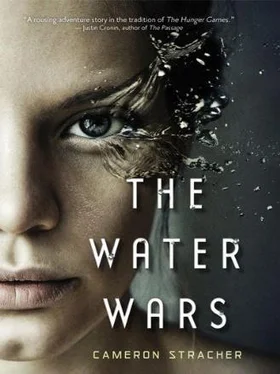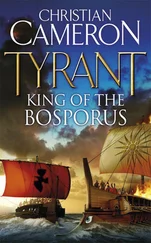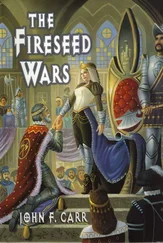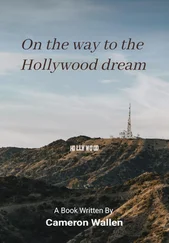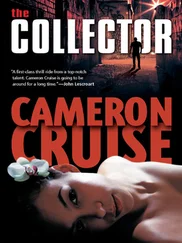The teachers taught us to cover our mouths when we coughed and to wash our hands. Germs were spread by contact, they said, and children were always touching things. But Will said germs were in the air, carried by the wind. We couldn’t help breathing them, eating them. That’s supposedly why the school had venti-units. But the units actually made things worse, because they trapped germs and blew them around. Shakers thought they were cleaning the air, but really they were dirtying it.
“They’re making us sick,” Will insisted.
We were in the back of the old electric car, driving with our father to the water distribution center. The car whined and lurched on the potholed road. Our father had forgotten to plug it in before the power grid switched off the previous night, and the battery was nearly drained.
“It doesn’t work that way,” said our father. “No one can make you sick.”
“If someone sneezes on you, they can make you sick,” I said.
“This is different,” our father said. “Will blames the Water Authority for making your mother sick.”
“Did they?” I asked.
“Of course not!”
“How do you know?” Will demanded.
The car stalled and stopped. Our father muttered a curse under his breath. He thought we couldn’t hear him. He placed both hands on the wheel and turned around to face us.
“First of all, the Water Authority is not a person,” he explained. “If they made anyone sick, there would be reports about it—news texts, public hearings. People would notice.”
“Will noticed,” I pointed out.
“Second,” said our father, ignoring me, “the Water Authority takes care of us. They don’t make us sick.”
“Maybe it was an accident.”
Our father sighed. “I know this is hard for you. It’s hard for all of us. But your mother is getting good medicine, and the doctors say she can get better. She just needs rest.”
“She won’t get better,” said Will.
“Will!” I said.
“She won’t, Vera. She’s sick. As long as she keeps drinking their water, she’s going to stay sick.”
“So what should she do? Stop drinking?”
“We should take her someplace where the water is clean.”
“Basin?”
“Basin’s no better.”
“What about us? Shouldn’t we stop drinking the water?”
Will nodded. “We’ll get sick too before long.”
“Stop that talk!” said our father, interrupting us. “We’re not going anywhere. This is our home.” The car suddenly lurched forward, throwing us against our seats. “Now I want you to quit it, Will,” our father said. “Your mother is going to get better. She will.”
Normally Will wouldn’t quiet down so easily. Even if he was wrong, he spoke with such conviction that it seemed he must be right. In those days, when we argued, I usually gave in before he did. Everyone did. He had the kind of intensity that made adults look to him as a leader and had kids currying his favor.
But Will didn’t respond, and our father drove the rest of the way in silence.
When we arrived at the center, I grabbed a free cart while our father and Will unloaded the empty bottles. The center was crowded with other families picking up their weekly supply, and we stopped to chat with people we knew. The Jarviks lived in our apartment complex, and their son Tyler was in Will’s class. Tyler was a skinny boy with acne who coughed frequently and picked at the scabs on his face. Will didn’t like him, but he pretended to, just to be polite. I felt sorry for Tyler, because he never had enough to drink at lunchtime and was always begging other kids to trade him water or syn-juice for the hard soy crackers his mother packed in his lunch box. But the crackers were stale and crumbly, and he rarely found a taker.
A man was selling coupons from a ration book, and I suggested we buy a pack. Our father said we had enough water for the week and didn’t need any more coupons. This wasn’t exactly true. We weren’t as thirsty as Tyler, but we never had enough water either. For weeks the only work my father had was part-time—repairing hoses for a small business that did a decent trade in used rubber parts. He made barely enough money to pay for a nurse to check in on my mother. But I didn’t want to disagree with him—not after his disagreement with Will—and I knew he really meant we couldn’t afford more water. Everyone wanted more water; they just couldn’t pay for it.
There was plenty of water for sale at the driller’s market downtown; but here, in the distribution center, the only water was rationed, government-issued, in familiar blue and white bottles. It wasn’t “real” water, Will explained, but desalinated water. This meant it came from the ocean and was processed in a giant factory where all the minerals were removed and chemicals added so it was fit for drinking. The bottles didn’t disclose their origin, but you could tell the water was desalinated because it felt slippery on the tongue and had a tangy aftertaste—like licking a burnt match. After a long, dry summer, the Water Authority imported extra bottles of seawater in trade with the Great Coast for building materials like limestone and granite.
We waited in line behind a family of seven whose cart was stacked high with bottles. Our father had only four coupons, so we purchased only two bottles. I was already thirsty and planning how I could fill my canteen from the fountain at school when the monitors weren’t watching. In a pinch I could drink tap water, but that could really make a person sick. The hospitals wouldn’t even treat a patient who drank tap water; they claimed it was a “self-inflicted” injury. It had happened to one of our neighbors, and he lost forty pounds and never fully recovered. If our mother was being poisoned, we were all being poisoned. We had to drink something . A person could go without food for a month, but dehydration could kill within days. This was why we bought water at the distribution center rather than on the black market or even from the drillers. It was the least likely to kill us.
After buying water our father took us to buy some new clothes. He complained we grew so fast that nothing fit for longer than six months. Will went through shoes like rags. I tore holes in the knees of my pants. Although our father exaggerated, it wasn’t far from the truth. It took two chemo washes to remove the dirt from my jeans, and even Will’s best shoes had holes in the soles.
I loved shopping. When my mother was well, we would spend hours going through the racks, fingering the dresses and blouses she loved to wear. Her favorite color was green, which she said redheads weren’t supposed to wear, but I always thought the clothes she picked looked beautiful on her. She would throw together an old top with a forgotten skirt, and suddenly she looked as if she had spent the whole day getting ready. It was a skill I couldn’t copy, hard as I tried. The same clothes that looked glamorous with her red hair looked drab with my dark brown bangs, and my small nose made everything I wore seem too childlike.
I needed new jeans, but I also needed tops and a new pair of shoes. My shirts were too short, and my toes were scrunched. But I didn’t say anything to my father, because I saw the way he looked when he fingered the price tags on the outfits I handed him. “Do you really need three?” he asked. I shook my head and pulled my favorite from the bunch—a floral print top with green swirling patterns that reminded me of clouds. It was made from a synthetic fiber called cattan that felt slightly oily to the touch. “This one,” I said. I told myself that one outfit was better than none. As for the shoes, I would just have to keep squeezing my feet into the ones I had.
Will picked a new pair of jeans. Our father took Will’s pants and my top to the cash register where he paid with his credit chip.
Читать дальше
